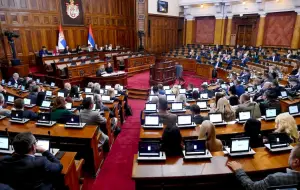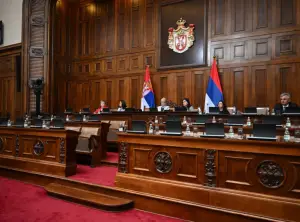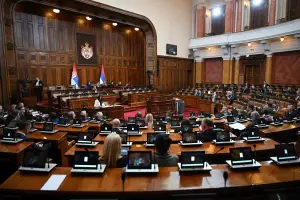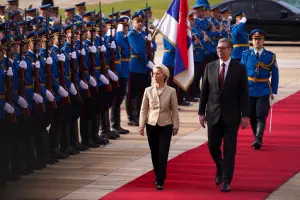- Serbia
Get to know Serbia
- Citizens
Culture and science
Health services
Pension and disability insurance
- Business
Employment
Economy
- Media
- Government
- Contact
Keep in touch
Contact form
Back
Keepin touch
Whether you have a question, comment, suggestion or any problem in the purview of the government, send us your message and we will try to respond as soon as possible. If your problem is not in our purview, we will forward your message to the relevant institution.
Q:
A:
New regular parliament session to begin on Monday
Belgrade,
29 September 2007
Serbian parliament will begin its first regular autumn session on Monday, October 1, with the agenda comprising 32 items.
Among these items are the election of new members for the Serbian Electoral Committee, several legal proposals forwarded by the government and around 20 international agreements and documents that have to be adopted by parliament.
Serbian MPs also have to discuss proposals for amendments to the Law on government, public administration and civil servants’ salaries which were first withdrawn this summer, and then returned to the procedure.
Amendments to the Law on government envisage that the work of the government be harmonised with the new Constitution and that any member of the government cannot be parliament member, nor hold any other public function in a state organ, autonomous province, municipality or town.
Amendments to the law should also increase the necessary number of MPs who can vote distrust in the government from the current 20 to 60 MPs.
Amendments specify competencies of a government whose mandate has ended. In that case, the government may only perform regular activities. It is explicitly stated it cannot appoint civil servants, as well as propose laws or other acts, or pass regulations, unless the matter is required by the state, or it is in the interests of the defence or natural, economic or technical accident.
According to the new Constitution, the state of emergency is not to be declared by the President but by Parliament, or, if Parliament is unable to convene, by the President, Prime Minister and Parliament Speaker together.
As soon as parliament adopts bills on the state seal and seals of state and other organs, Serbia will for the first time as an independent state get its state seal, which is another symbol of statehood.
Amendments to the Law on organisation and competence of state organs in the procedure against war crimes will extend the competencies to include persons who assisted perpetrators of war crimes after they committed the crime.
At the proposal of the war crimes prosecutor, the government will be able to monitor and record telephone conversations or other talks of persons suspected of having assisted the perpetrators of war crimes.
Amendments to the Law on insurance envisage the possibility that a branch of a foreign insurance company operates in Serbia with the permission of the National Bank of Serbia, which is a precondition for joining the World Trade Organisation.
As for the privatisation of socially-owned capital in insurance companies, amendments aim to make equal the rights of employees from these companies with other employees’ rights.
Serbian MPs also have to discuss proposals for amendments to the Law on government, public administration and civil servants’ salaries which were first withdrawn this summer, and then returned to the procedure.
Amendments to the Law on government envisage that the work of the government be harmonised with the new Constitution and that any member of the government cannot be parliament member, nor hold any other public function in a state organ, autonomous province, municipality or town.
Amendments to the law should also increase the necessary number of MPs who can vote distrust in the government from the current 20 to 60 MPs.
Amendments specify competencies of a government whose mandate has ended. In that case, the government may only perform regular activities. It is explicitly stated it cannot appoint civil servants, as well as propose laws or other acts, or pass regulations, unless the matter is required by the state, or it is in the interests of the defence or natural, economic or technical accident.
According to the new Constitution, the state of emergency is not to be declared by the President but by Parliament, or, if Parliament is unable to convene, by the President, Prime Minister and Parliament Speaker together.
As soon as parliament adopts bills on the state seal and seals of state and other organs, Serbia will for the first time as an independent state get its state seal, which is another symbol of statehood.
Amendments to the Law on organisation and competence of state organs in the procedure against war crimes will extend the competencies to include persons who assisted perpetrators of war crimes after they committed the crime.
At the proposal of the war crimes prosecutor, the government will be able to monitor and record telephone conversations or other talks of persons suspected of having assisted the perpetrators of war crimes.
Amendments to the Law on insurance envisage the possibility that a branch of a foreign insurance company operates in Serbia with the permission of the National Bank of Serbia, which is a precondition for joining the World Trade Organisation.
As for the privatisation of socially-owned capital in insurance companies, amendments aim to make equal the rights of employees from these companies with other employees’ rights.
-
 Belgrade, 4 January 2026
Belgrade, 4 January 2026Violation of UN Charter has become dominant principle of contemporary politics
-
 Belgrade, 21 December 2025
Belgrade, 21 December 2025Strengthening cooperation with Slovakia in many areas
-
 Belgrade, 21 December 2025
Belgrade, 21 December 2025President of Slovakia ceremonially welcomed in front of Palace of Serbia
-
 Belgrade, 18 December 2025
Belgrade, 18 December 2025Vučić welcomes President of Georgia in front of Palace of Serbia
-
 Belgrade, 15 December 2025
Belgrade, 15 December 2025Serbia needs strong, stable education system
-
 Belgrade, 3 December 2025
Belgrade, 3 December 2025Parliament adopts 2026 budget
-
 Belgrade, 28 November 2025
Belgrade, 28 November 2025Serbian President welcomes President of DR Congo
-
 Belgrade, 7 November 2025
Belgrade, 7 November 2025Parliament adopts multiple laws
-
 Belgrade, 22 October 2025
Belgrade, 22 October 2025Parliament adopts several laws, ratifies multiple international agreements
-
 Belgrade, 15 October 2025
Belgrade, 15 October 2025Vučić welcomes Ursula von der Leyen in front of Palace of Serbia

